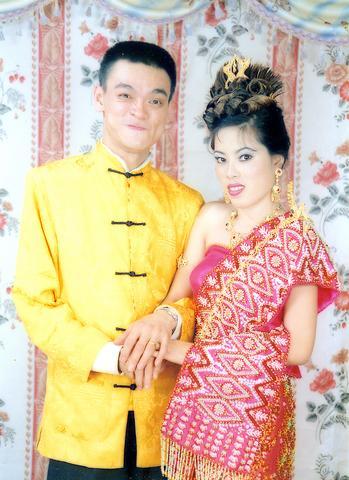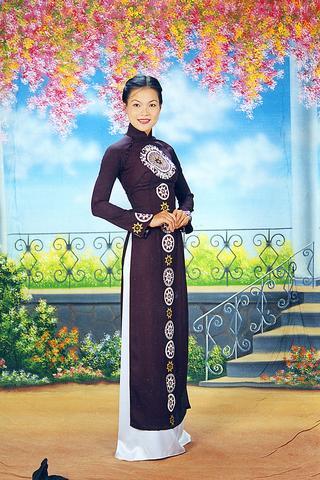Hsu Chia-peng (
The marriage broker took him to a small apartment to meet the girls. There were dozens of them waiting to meet this 40-year-old Taiwanese man. They were

PHOTO COURTESY OF TSAI TSUNG-LUNG
dressed in T-shirts, with light make-up and smiles, coming in groups of three to meet with Hsu.

PHOTO COURTESY OF TSAI TSUNG-LUNG
Just like an emperor choosing his concubines, Hsu sat on a sofa as the girls came to sit down. Marriage broker Wu Ling-ming (
"From the first group, you pick a good-looking girl and take her as the standard. In the following groups, you keep the girls who are better looking than her and get rid of the others. And then form a new group for the girls you have kept. And then use the same way to sift out the rest of the girls. This way, you won't miss any good-looking ones and can choose the best," Wu is filmed saying.
Hsu finally picked a girl. But he said he did not like this kind of meeting. He wanted to find the girl in the picture, which the broker Wu had shown him in Taiwan.
Wu later took Hsu to the house of the girl in the picture, the 24-year-old Ah-luan (阿鑾). They briefly met and immediately Wu asked him to give Ah-luan's mom US$600 as the money for engagement.
The next day, Hsu and Ah-luan, accompanied by Wu, went on a day trip rowing on the Mekong river. Hsu placed his arm on Ah-luan's shoulder. He had decided to marry her.
The third day, they had a simple wedding. And the fourth day Wu and Hsu had a celebration for "closing the deal." Hsu, just married, seemed very happy and got drunk that night.
"Wedding through matchmaking may not be the best way, but it is the most economical and time-saving method," Wu said.
The fourth day, the newly-wed couple went to the Taipei Economic and Cultural Office in Ho Chi Minh City for the official paper work and interviews -- where there were dozens of other couples like Hsu and Ah-luan.
In another of the segments from the film trilogy by the
documentary-maker, Hsu is shown working as a chef at a high-class hotel.
Because of his long working hours and shy personality, he has no time to make girlfriends. So he pays broker Wu NT$250,000 for his imported bride and is shown bringing her back to his apartment in Hsihchih, Taipei County.
According to Wu Chien-kuo (
If overseas wives from China are included in the statistics, the number of overseas wives is estimated to be more than 230,000. This is close to the number of foreign workers in Taiwan and the population of Aboriginal people.
"The government and the whole of society has not yet faced up to the existence of these people. These women have been stereotyped as ignorant and menial. And they are seen as only functional in [terms of their] housework and [giving birth], in order to carry on the family's name for the husbands," filmmaker Tsai said.
"On the other hand, Taiwanese husbands are stereotyped as either physically or intellectually disabled, of low moral standards, or chauvinist pigs."
Tsai said he tries not to reinforce these stereotypes but to look at how those couples facing challenges because of their age differences, cultural differences and language barriers, overcome them..
Another episode in Tsai's documentary focuses on Huang Nai-hui (黃乃輝) and his Cambodian wife Chiang Na-wei (強娜威). Suffering from cerebral palsy, Huang is determined not to be defeated by the illness, but tries even harder to reach his life goals, including getting a successful job, getting married and having children.
Three years ago, he made it. He disregarded his friends' slights and spent NT$400,000 to marry his wife, who is 20 years younger than him. Their daughter is now two years old. But when he accompanied his wife back to Cambodia, bringing red envelopes to the families, problems emerged. There was not enough money to give out and Huang felt that he'd been ripped off.
"Your family does not look that poor. Why do they always want my money?" Huang yelled at his wife.
"They did not say they wanted your money. But if we weren't poor, why would I want to marry you?" his wife yelled back, in fluent Chinese.
The couples in Tsai's films are in fact positive cases where the wives eventually get accustomed to the environment, and there is no (at least not yet) domestic violence taking place.
Taking a stroll through villages in south Taiwan, it is easy to see ads posted on wire poles, that say: "Vietnamese brides, Mainland brides. Call [telephone number] ... Virgins guaranteed. If not, get a refund ... If she runs [away], we will give you another."
These ads reflect a kind of local culture that degrades women as commodities, especially women from South East Asia. As a result of such a culture, every year, there are cases of foreign brides being abused by the husband and his family.
In February this year, a Vietnamese wife was found sick and deserted, lying in a corner of a wood factory in Taichung county. She told the police that her husband constantly abused her because she could not get pregnant after four years of marriage. And this time, he left her hungry for seven days and deserted her at the factory.
Wu , from the Taipei Economic Office in Ho Chi Minh City, said it had been reported by a Vietnamese family that their daughter was used and shared by both the husband and the father-in-law.
"If it is true, we have almost become a country of animals," Wu said.
So far, there are only a few social welfare groups offering programs for foreign brides facing domestic violence, and to help them with learning the language and getting used to the culture. These organizations are the Eden Foundation, the Pearl S. Buck foundation and the Catholic Rerum Novarum Center.
As for the role of the government, it was announced in January this year that the government will set up guidance programs to assist foreign brides with their education and to prevent domestic violence. It will also set up stricter regulations for marriage broker businesses. But it has been 10 years since foreign brides have been imported to Taiwan. That is to say, the brokers have been earning huge profits illegally for all that time.
The foreign bride population will keep growing, director Tsai said. "It is in fact an immigration issue, not just a marriage issue," he said.
"Taiwan used to be an immigration society. We are all offspring of immigrants. And for the foreign brides in Taiwan, they are actually new female immigrants in Taiwan."
But before these new immigrants are taken seriously, it seems that there is a lot of work to be done.
My Imported Wife -- the story of Huang Nai-hui and his Cambodian Wife will be screened at 10pm, June 26, on Public Television Service (PTS) channel. My Imported Bride -- the story of Hsu Chia-peng and his Vietnamese wife will be screened at 10pm, July 3, on PTS channel.

June 2 to June 8 Taiwan’s woodcutters believe that if they see even one speck of red in their cooked rice, no matter how small, an accident is going to happen. Peng Chin-tian (彭錦田) swears that this has proven to be true at every stop during his decades-long career in the logging industry. Along with mining, timber harvesting was once considered the most dangerous profession in Taiwan. Not only were mishaps common during all stages of processing, it was difficult to transport the injured to get medical treatment. Many died during the arduous journey. Peng recounts some of his accidents in

“Why does Taiwan identity decline?”a group of researchers lead by University of Nevada political scientist Austin Wang (王宏恩) asked in a recent paper. After all, it is not difficult to explain the rise in Taiwanese identity after the early 1990s. But no model predicted its decline during the 2016-2018 period, they say. After testing various alternative explanations, Wang et al argue that the fall-off in Taiwanese identity during that period is related to voter hedging based on the performance of the Democratic Progressive Party (DPP). Since the DPP is perceived as the guardian of Taiwan identity, when it performs well,

The Taiwan People’s Party (TPP) on May 18 held a rally in Taichung to mark the anniversary of President William Lai’s (賴清德) inauguration on May 20. The title of the rally could be loosely translated to “May 18 recall fraudulent goods” (518退貨ㄌㄨㄚˋ!). Unlike in English, where the terms are the same, “recall” (退貨) in this context refers to product recalls due to damaged, defective or fraudulent merchandise, not the political recalls (罷免) currently dominating the headlines. I attended the rally to determine if the impression was correct that the TPP under party Chairman Huang Kuo-Chang (黃國昌) had little of a

At Computex 2025, Nvidia CEO Jensen Huang (黃仁勳) urged the government to subsidize AI. “All schools in Taiwan must integrate AI into their curricula,” he declared. A few months earlier, he said, “If I were a student today, I’d immediately start using tools like ChatGPT, Gemini Pro and Grok to learn, write and accelerate my thinking.” Huang sees the AI-bullet train leaving the station. And as one of its drivers, he’s worried about youth not getting on board — bad for their careers, and bad for his workforce. As a semiconductor supply-chain powerhouse and AI hub wannabe, Taiwan is seeing